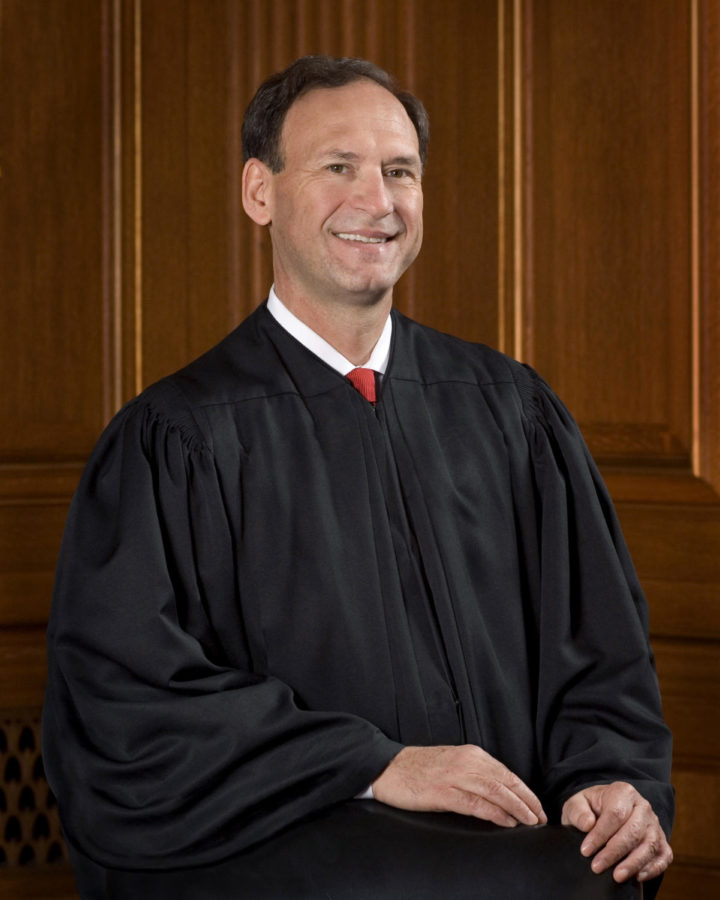On the morality and logic of the Supreme Court of the United States
Courtesy of www.supremecourt.gov/
“The holding exercised raw judicial power and sparked a national controversy that has embittered our political culture for half a century.”
Life, Liberty, and the pursuit of happiness. The natural rights described by the father of liberalism, John Locke. The knowledge of these rights only begs the question of their definitions, and specifications. Is the life of another more important than your own? Do you have the liberty to make decisions about yourself? What constitutes the pursuit of happiness? Where is the line drawn between achieving your own happiness and infringing upon that of another and more importantly who draws it? The Supreme Court of the United States has a new ideological answer to these questions. Yes, others’ lives are more important than yours, even if they are unbeknownst to their own existence. No, you do not have the liberty to make decisions about yourself, especially if you have a uterus. The pursuit of happiness consists of what makes people in power happy and the line between your happiness and that of another, no matter where it is drawn is not drawn by you. It is drawn by those with power and those who care not for your happiness or that of others.
News of this repeal comes from a leaked draft majority opinion written by justice Samuel Alito who has served as a justice on the supreme court since his inauguration under the Bush administration in January of 2006. It is the opinion of the court that the decision in the 1973 case Roe V Wade was one that the court got “egregiously wrong from the start” and that the court that made that decision overstepped their bounds since there is no mention of this right in the constitution. Five of the republican justices on the Supreme Court are reported to be in favor of the draft opinion while the three democratic justices write their own dissenting opinions to the decision. The opinion of Chief Justice Roberts is unknown.
This leaked opinion is concerning for a number of reasons. The first and most prominent one being the faulty logic behind the decision to repeal the decision that lacks any sort of basic reasoning. The first few pages of the leaked decision concern the logic for the repeal in what could be considered great detail. One of the prominent reasons cited often being that the court’s decision lacked any sort of constitutional foundation and over stepped to the point where it could almost be considered legislating. Justice Alito writes, “After cataloging a wealth of other information having no bearing on the meaning of the Constitution, the opinion concluded with a numbered set of rules much like those that ‘might be found in a statute enacted by a legislature.” It is concerning to see such an opinion being held by the court. This statement above implies that there is no foundation in the constitution for laws regarding abortion which is simply not true. And it is an ideal that has caused concern since before the constitution was even settled as a foundation of our government. In Federalist No. 84 Alexander Hamilton discusses miscellaneous proposed opposition to the new constitution including its original lack of a bill of rights. In this writing Hamilton asks the question, “Is it one object of a bill of rights to declare and specify the political privileges of the citizens in the structure and administration of the government?” He also writes, “they would contain various exceptions to powers not granted; and, on this very account, would afford a colorable pretext to claim more than were granted. For why declare that things shall not be done which there is no power to do?” All this puts in a rather eloquent manner that a bill of rights will greatly restrict the rights of the people. It can be assumed that in a bill of rights meant to protect the rights of the people that any rights not included are not rights which the people have. Hamilton rightfully considered this a very dangerous idea. There are innumerable rights which citizens of this country have even if they are not explicitly written in the constitution itself.
This is what led to the creation of the ninth amendment which is included in the bill of rights we all know and cherish. The ninth amendment very shortly reads, “The enumeration in the Constitution, of certain rights, shall not be construed to deny or disparage others retained by the people.” meaning that just because the right to something is not specifically listed in the all too short bill of rights does not mean that it is not a right that belongs to the people. Abortion is no exception to this and the opinion held by Justice Alito undoubtedly infringes on this ideal to a dangerous extend. It could set a precedent that allows for the repealing of a number of important cases that protect important rights just because they deal with rights outside the scope of the original bill of rights. For some it may even call into question the need for a bill of rights if all it does is harm the natural rights of this country’s citizens akin to how it was originally questioned by the federalists who wrote it. This has potential to rip the festering ideological divisions in this country to a terrifying new breadth.
Justice Alito also has a great concern about the ideological divisions in this country; another reason he cites for the opinion supporting repeal. He cites a dissent written by Justice Byron White that claims the holding “exercised raw judicial power and sparked a national controversy that has embittered our political culture for half a century.” The concern for political divide is a decidedly noble one, but it rings rather hollow when it is crusted with hypocrisy. By repealing the protections set in place by the decision of Roe V Wade the court has divided the country even further. This a decision that has held prominence for the better part of half a century. These are rights and protections that are exercised every single day across the country. According to the center for disease control (CDC), “In 2019, 629,898 legal induced abortions were reported to CDC from 49 reporting areas. Among 48 reporting areas with data each year during 2010–2019, in 2019, a total of 625,346 abortions were reported, the abortion rate was 11.4 abortions per 1,000 women aged 15–44 years, and the abortion ratio was 195 abortions per 1,000 live births.” If the decision to repeal Roe V Wade is followed through with a great number of these will become illegal and in some cases very dangerous. A study done by the Pew reasearch center claims that , “a majority of Americans (61%) continue to say that abortion should be legal in all (27%) or most (34%) cases.” While this is not an overwhelming majority it is still a majority. Millions of people believe in the protection of abortion rights. Many of these people are directly impacted by the ability to exercise these rights. Will it not cause anger to repeal these rights from these people? Will it not cause an embitterment of our political culture to strip these people of these rights?
As for the remark about the exercise of “raw judicial power”, is it not within the power of the court to remark on the constitutionality of legislation? Is the Supreme Court not allowed to list in great detail whether or not legislation is or is not allowed based on whether or not it infringes upon the rights granted in the constitution? In the original holding given by the supreme court Justice Blackman cited the fourteenth amendment’s implied right to privacy for the reasoning of the protection of abortion laws. This court also held through the fourteenth amendment that since these were rights protected by the constitution, through selective incorporation they must also be applied to the states. Selective incorporation is not an example of raw judicial power. It is an ideology that protects the citizens of certain states from their rights being infringed upon. It is the same doctrine that protected the second amendment right of chicago citizens (McDonald V Chicago), sixth amendment rights to a lawyer (Gideon V Wainwright), religious rights against the establishment of a national religion (Engel V Vitale), rights against censorship (Near V Minnesota) , fourth amendment rights against unlawful search and seizure (Mapp V Ohio), and many many more. This is not an unprecedented use of this power to decide on the selective incorporation of rights to the states. It is a necessary and vital function of the Supreme court and the argument that it is too much power for the Supreme Court to have threatens more than just the decision made by Roe V Wade. If this can be cited as a decision for the repeal then what’s to stop the repeal of many such cases that use the power of the federal government at the expense of the power of the states? Quite simply, the argument made by Justice Alito for the repealing of Roe V Wade threatens more than a hundred years of court decisions that extend far beyond the issues in Roe V Wade. It sets a precedent that puts dozens of protected rights in this country at great risk.
Beyond the issues with the draft decision’s reasoning is the implications of what this decision means for rights and equality in this country. It is a decision that disregards the rights of women (and others who do not identify as women but who still have female reproductive organs and are at risk of unwanted pregnancies) to make decisions about their own body. It is an ungodly infringement upon the widely accepted definition of natural rights. It is a denial for people all over the country to be able to decide on their own lives. It puts at risk millions of people who will be hurt (physically, mentally, and financially) by the requirement to carry a fetus to term and care for it after birth. It is a decision that will do far more damage to the people of this country than the comparatively easy task of being upset about opinions that some people disagree with. This repeal is an exercise of raw judicial power. It is an overstep to strip these protections away from citizens. It is a cancer to the progress of equality. It is far more than a question of opinion. The decision to do what one will with their own body is undoubtedly a natural right and it is something that the Supreme Court of the United States needs to protect. The decision to repeal guaranteed protections of these rights is a disgusting one. It is discriminatory to the fullest extent of the word. No soul in this country or on this planet should have the right to decide what one does with their own body. It is beyond an ideological question at this point. It is a moral one. And no, not the morals of impregnated persons who make the decision to best save themselves and in many cases others (family members, significant others, close friends), at the expense of an unborn child. It is a moral question regarding those who believe it is okay to dissect the rights of American citizens based on their own political viewpoints. The thought that five people (who are far removed from the ramifications of this decision) are allowed to make this decision for millions of citizens is horrifying and it is my humble opinion that it is a decision that cannot in good conscience be made.

Caius is a senior at A-West and loves to write. After graduation Caius plans on attending a 4 year college for journalism in...



